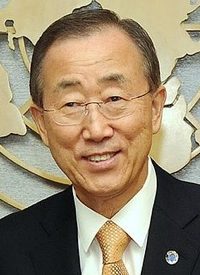
Governments are notorious for pretending to be fiscally responsible while in actuality engaging in all sorts of trickery to disguise their free-spending ways. The United Nations being an assemblage of governments, and one with next to no accountability at that, it is hardly surprising that such chicanery runs rampant there as well.
For example, UN Secretary General Ban Ki-moon (picture, left) is preparing to address UN officials on how the organization can extricate itself from what he has called an “emergency situation” with its finances. With governments the world over suffering the effects of reduced revenue and exploding deficits, the UN, having been just as irresponsible as its member states (if not more so), is also finding its finances in a precarious position. Ban has therefore proposed a three-percent cut in the UN Secretariat’s budget over the next two years.
Yet for all his talk about austerity in recent years, Ban has “increased the size of his own Secretariat by 38 percent, nearly twice the growth rate of the rest of the U.N. system worldwide during the same one-year period [2008 to 2009], according to confidential figures obtained by Fox News.” “Moreover,” writes George Russell, “those hiring figures do not yet factor in another major boost in U.N. Secretariat spending that has taken place over the past two years.”
While “other U.N. agencies … made significant staffing increases of their own,” Russell notes, “Ban has been responsible for hiring more than 8 out of 10 new U.N. staffers taken aboard worldwide during 2009.” Thus, even if his proposed “painful” three-percent cut were to be enacted, it is “is very unlikely to do anything significant about the Secretariat’s spending problems,” Russell maintains. In fact, because Ban employs the same twisted logic to define a cut as most governments do, namely as a reduction of a proposed increase, his 3 percent cut, says Russell, “would, essentially, leave spending exactly where it left off in 2011,” i.e., well out of control.
Just as the U.S. government hides much of its profligate spending in so-called “off-budget” items, so Ban has been concealing his excessive hiring in what the UN terms “extra-budgetary” spending. According to Russell, “less than one-quarter of the U.N.’s manpower, and only 29% of the staffing for U.N. organizations worldwide, is carried on the regular budgets of the U.N. system.” The rest is paid for via “extra-budgetary” funds. Russell elaborates:
These funds are deemed to be “voluntary,” because contributions do not follow a fixed schedule, even though the same affluent and middle-income nations continue to pay most of the bill. The “extra-budgetary” lines on U.N. budgets have, if anything, grown more rapidly in virtually all cases than “regular” budgets. Indeed, in the cases of some of the biggest and most stable U.N. organizations, such as UNDP [United Nations Development Program] and UNICEF, the entire budget is deemed to be “voluntary.” In his 2009 hiring binge for the U.N. Secretariat, Ban kept to the same principle: he hired only one staffer on the regular budget for every two he put on the “extra-budgetary” payroll, even while setting records for hiring with both.
Anyone expecting financial prudence to emerge from the UN — and especially from Ban, whose “ostensibly frugal budgets” for 2010 and 2011, Russell writes, “called for nearly $1 billion in additional spending compared to the previous two years, most of it ‘extra-budgetary’” — might just as well be waiting for Godot.
Unfortunately, taxpayers are being continually bilked to pay for such bureaucratic bloat. U.S. taxpayers, in particular, get taken for a ride: the United States pays 22 percent of all UN dues, far outstripping every other country. Japan comes in second at 12.5 percent. With both countries reeling from recession — and, in Japan’s case, natural disasters and their aftermath — now would be a perfect time for both to tell the criminal gang on the East River to take a hike. If its two biggest contributors left, the organization’s baleful influence would diminish considerably.
As always, citizens of all nations that value their national sovereignty are urging their leaders to get the (pick one): U.S., and Japan, and every other country out of the UN!



